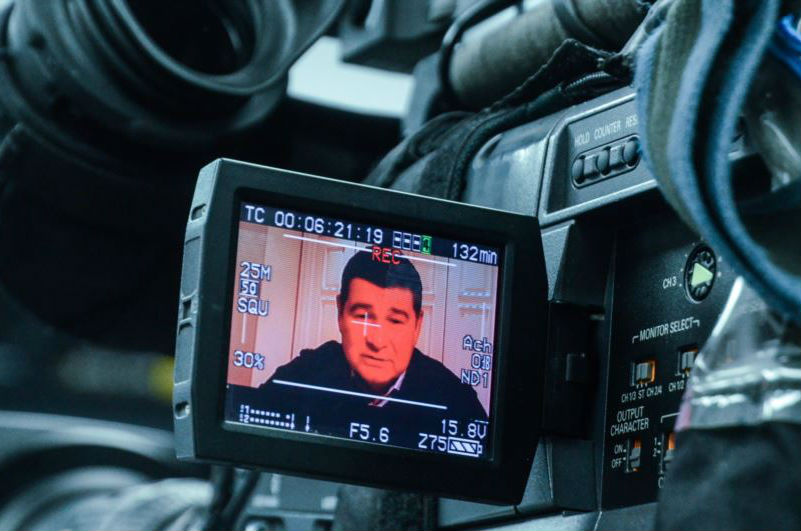 Over the past six months, the case of Oleksandr Onyshchenko has gripped Ukraine. It is an important case, touching on the country’s hopes and disappointments concerning the scourge of corruption.
Over the past six months, the case of Oleksandr Onyshchenko has gripped Ukraine. It is an important case, touching on the country’s hopes and disappointments concerning the scourge of corruption.
The case burst on the political scene in the spring, when the National Anti-Corruption Bureau (NABU) brought charges against Onyshchenko, a businessman and Rada member. NABU accused Onyshchenko of theft for his mismanagement of the state gas company, Ukrgazvidobuvannaya. According to the indictment, he embezzled 1.6 billion hryvnia (Hr), or $64 million, between January 2014 and January 2016 by arranging the sale of gas to his own firms for the low price of 2,640 Hr per 1000 cubic meters; those firms then resold the gas for 6,900 Hr per 1000 cubic meters and pocketed the difference.
This case created political excitement: it seemed that the still-new NABU, whose establishment took longer than expected, was finally bringing corruption charges against a major, well-connected figure. Excitement only grew last summer when the Rada, prodded by Prosecutor General Yuriy Lutsenko, voted to remove Onyshchenko’s immunity from criminal proceedings. By law, all Rada members have this immunity, one of anticorruption activists’ major complaints. The Rada’s vote seemed to signal a new day in the country’s fight against corruption.
After the Rada lifted his immunity, Onyshchenko fled to Moscow, where he reportedly received a Russian passport, and then to London, where he asked for asylum. In August, the General Prosecutor’s Office put him on the Interpol list and sought his extradition from the United Kingdom.
Through the summer, this seemed to be good news for Ukraine; but in the fall, Onyshchenko began to fight back. His method was not to proclaim his innocence but to argue that he was the victim of selective justice after he had performed numerous unseemly duties on behalf of Ukrainian President Petro Poroshenko and his closest aides. Suddenly, the good news story had another, troublesome dimension, highlighting the country’s longstanding problems with corruption at the highest levels. Reformers in Ukraine who have complained about the government’s delay in attacking corruption were only too happy to amplify Onyshchenko’s charges.
Those claims were not pretty. The first one was about Poroshenko buying votes in the Rada and regional parliaments. The second concerned government decisions designed to favor businesspeople associated with Poroshenko’s team. The third claimed that Poroshenko’s team was also a beneficiary of the Ukrgazvidobuvvanaya scheme that had indicted Onyshchenko. Fourth, Onyshchenko charged that on behalf of Poroshenko, he had orchestrated a ten-month, $30 million campaign designed to weaken and remove Arseniy Yatsenyuk as prime minister. Finally, Onyshchenko maintained that Poroshenko had NABU manufacture charges against him after he supported the “pro-Western opposition.”
Onyshchenko claimed to have recorded tapes that would prove his charges. However, the tapes have not lived up to the hype so far. The one released tape recorded a September conversation in London between Onyshchenko and Rada Deputy Oles Dohivy, who appeared to be negotiating a deal to drop the charges against Onyshchenko; in exchange, Poroshenko would benefit financially. A second person, journalist Michael Posolskaya, has surfaced claiming to have also tried negotiating a deal with Onyshchenko.
While these revelations excited Ukraine’s political class and illustrated that corruption remains entrenched at the top, the evidence was thin. Importantly, there was no clear link between Dohivy and Poroshenko. This didn’t slow down Onyshchenko, however, who gave an interview to Time about corruption in Ukraine, which was long on charges and short on specifics.
Onyshchenko met with the FBI and turned over the tapes. But a spokesman for the US Department of Justice recently told Radio Free Europe/Radio Liberty that the bureau had cut ties with Onyshchenko.
Unless Onyshchenko has more and better evidence, his sensational charges against the president and his associates will largely fade. But not entirely, because many Ukrainians are convinced that corruption remains a major problem at all levels of public life.
This is both unfortunate and ironic. Unfortunate, because in a law-abiding society, a person is innocent until proven guilty. Ironic, because Ukraine has witnessed two remarkable steps to fight corruption in the past few months, and the president and the prime minister deserve a great deal of credit for both. The first was the passage of e-declaration legislation demanding that Rada deputies and senior government officials file public documents detailing their assets. The second was the nationalization of PrivatBank, the nation’s largest and formerly the property of one of the country’s biggest oligarchs. After years of stagnation, Ukraine is taking the right steps toward reform. And the Onyshchenko case itself is one more indicator of that.
It is likely that one major obstacle to anticorruption efforts in Ukraine is the close interaction among big businessmen and senior government officials. The idea is that at one time or another, they have all done something shady; those in power are reluctant to go after corrupt businessmen because if they do, those under investigation may reveal officials’ misdeeds. Certainly Onyshchenko tried to do so. If he fails, that may be a boon to anticorruption campaigns.
In any case, the action now is in London, where Ukraine has to make its case to a British judge that Onyshchenko broke Ukrainian law and should be extradited. This story is not over.
John E. Herbst is Director of the Atlantic Council’s Dinu Patriciu Eurasia Center; he served as US Ambassador to Ukraine from 2003 to 2006.
Image: Oleksandr Onyshchenko speaks at a news conference via Skype on December 21, 2016. Credit: Serhii Nuzhnenko/RFE/RL
